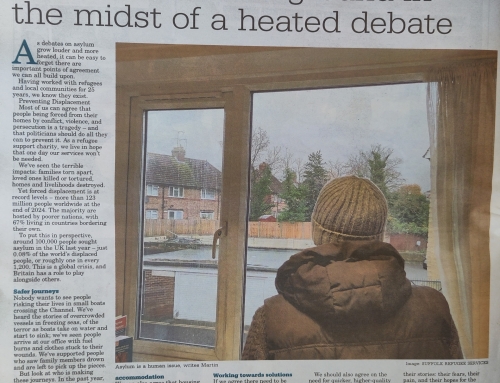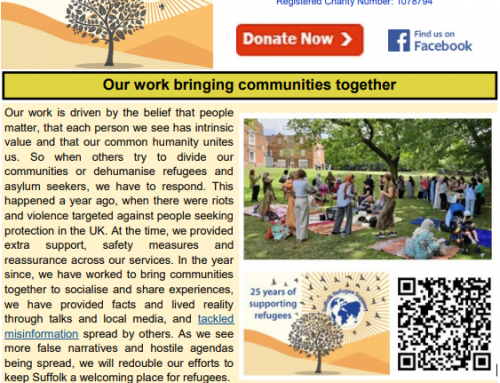As part of the Government’s Syrian Vulnerable Person Scheme, political leaders across Suffolk’s public sector unanimously agreed to take up to 200 Syrian refugees over the next five years.
A task group including representatives from local authorities, health, police and the voluntary and faith sectors has been set up to put in place appropriate housing, education, health and support services provision.
Due to the location of suitable housing, health, education and support services the refugees will be settled predominantly in the greater Ipswich area. Housing will predominantly be via private sector landlords.
Suffolk Refugee Support has been commissioned to provide specialist case work for those arriving from Syria.
For details of the Government’s response and related FAQs visit www.gov.uk/government/news/syria-refugees-what-you-can-do-to-help–2
FAQs
- How are refugees selected to be part of the scheme?
- The United Nations High Commission for Refugees (UNHCR) undertake screening assessments in refugee camps to select individuals and families based on the following criteria:
- Women and girls at risk;
- Survivors of violence and/or torture
- Refugees with legal and/or physical protection needs
- Refugees with medical needs or disabilities
- Children and adolescents at risk
- Persons at risk due to their sexual orientation or gender identity and
- Refugees with family links in resettlement countries
UNHCR assess Syrian families in refugee camps and refer cases to the Home Office who then check they meet the eligibility criteria and carry out security checks.
- When are the first refugees coming?
- The first arrivals are expected in Suffolk during March 2016.
- Where will refugees live?
- There is no preconceived plan as to exactly where refugees will be housed, other than within the greater Ipswich area. As refugees will be arriving over a long period of time (up to five years), it is not possible to say at this stage exactly where they will be housed.
- How long can refugees stay in the UK for as part of the scheme?
- Those who are accepted under the VPR scheme will be granted humanitarian protection giving them leave to remain in the UK for 5 years.
- What happens after the five years?
- The refugees will choose whether they are in a position to return to Syria or they will apply for further leave to remain in the UK.
- Local services are already under pressure- surely this will tip them over the edge?
- The numbers of refugees who will be arriving in Suffolk as part of this scheme is relatively small compared to the ebbs and flows of the population in the county. We considered the capacity of local services when deciding how many refugees we could offer to bring to Suffolk. These numbers will not create a noticeable impact on access to local services.
- How can I offer my support?
- If you would like to donate items, time or money please see above
- Do you need offers of accommodation?
- No thank you. We do not need offers of accommodation. Housing will predominantly be via private sector landlords.
- What if you don’t need the items I have?
- Each time a new people arrive in Suffolk we will update the list of items we need. However, if you have furniture that we don’t need for this project, please consider donating it to the Ipswich Furniture Project www.ipswichfp.org/
- How will the settled community be supported?
- We don’t expect the settled community will notice any difference. New people arrive to live in the county every day.
- Is crime and disorder likely to increase?
- No. Statistically refugees arriving to live in the UK are more likely to be victims of crime.




